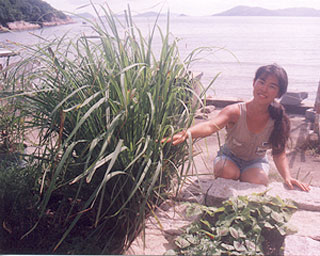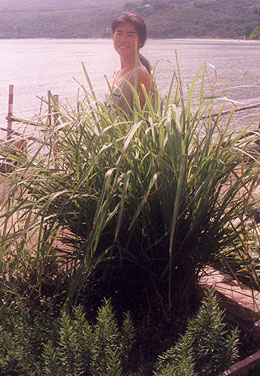
![]()
Search the Journey to Forever website – click HERE
|
Journey to Forever: Make a donation |
Navigation
Contact usTo Keith Addison Handmade Projects |
 Handmade Organic Mosquito Repellent (HOMeR)
Handmade Organic Mosquito Repellent (HOMeR)
The abandoned ricefields in our valley on Lantau Island bred hordes of fierce mosquitoes, and at dusk they attacked. They were highly aggressive, you could be bitten hundreds of times without protection, it was torture, impossible to bear. It's also unpleasant stuff to have on your skin – and with those mosquitoes you had to cover every single square inch of exposed skin, they'd even bite you right through a T-shirt or your socks. An alternative was incense coils, which fill the air with smoke containing insecticides and, indeed, the mosquitoes keep away. Wise of them – we didn't like the coils much more than they did. We tried all the commercial herbal preparations, but they weren't effective. Rubbing the long, grassy leaves on the skin worked well, but the stalk worked even better. Here's how: It's pleasant on the skin, it has a pleasant smell, and it's effective: it gave us 98% protection at sundown, 100% any other time, and the effect lasted about 4–5 hours. In most places, where the mosquitoes are less fanatical, you can use less and it'll last longer. We tried making tinctures so we could spray it, and it worked just as well. We used whatever booze we could find in the booze cupboard (we don't drink, but somehow people kept giving it to us): chop up the cores of five or six stalks of lemon grass, put them in a blender with a tumblerful of spirits, blend thoroughly, strain, and put it in a sprayer. The extremely cheap Chinese brandy went first, the not so cheap Absolut vodka worked even better and we didn't smell quite as much like winos, and when that was finished we used London Dry Gin. Then we found it didn't need the spirits. We'd thought alcohol was required to dissolve the lemon grass essential oil, but it worked just as well if you blended it with water. Just shake the sprayer before using it. After we moved to Japan, we ran a small organic farm in a farming village not far from Kyoto, and again we were surrounded by rice paddies which bred plenty of mosquitoes – not as fierce as the Lantau variety, but not exactly toothless either. But we couldn't get lemon grass in Japan, and anyway it wouldn't have over-wintered: the summers are hot, but it freezes in winter. Instead we bought some lemon grass essential oil, which is easy to find and not very expensive. We added a couple of other essential oils for extra effectiveness: we found a combination of lemon grass oil, citronella oil and eucalyptus oil gives good protection all day. Mix about 1 ml each of lemon grass oil, citronella oil and eucalyptus oil with 100–150 ml of water. Lemon grass is also an effective herbal anti-fungal medicine (lemon grass tea) and in Puerto Rico people use the fibrous stalks as a natural toothbrush! Clean and tingling fresh! (Try it!) Deforestation and industrialized farming are also two of the factors causing an alarming increase in the range of mosquitoes. Mosquitoes also cause yellow fever, dengue fever, filariasis and West Nile virus. Dengue is caused by a virus transmitted by the Aedes aegypti mosquito as it bites. The World Health Organisation estimates that there may be 50 million cases each year, and the incidence is rising, with some countries reporting what the WHO terms "explosive" outbreaks. So the search is intensifying for safe, cheap, effective, locally available alternatives to insecticides and to the malaria drug treatments that no longer work. In other words, plants.
But the commercial repellent sprays mostly use diethyl-meta-toluamide (DEET), a rather nasty chemical that can cause rashes, swelling, eye irritation, and worse problems, though they're unusual – including brain swelling in children, anaphylactic shock, low blood pressure, and one report of death.

Two weeks earlier we'd cut this lemon grass to the height of Midori's hand
Finally we found a good answer. We planted three stalks of Thai lemon grass (Cymbopogon citratus) that we'd bought at a local market, and after a few months they grew into a composite clump about 15" across (38 cm). We used a lot of stalks for cooking, but the clump didn't seem to get any smaller. We cut the tops every couple of weeks because it would start to shade out the other plants in the herb bed (it gave us lots of green stuff for the compost), but it quickly grew back. And it kept the mosquitoes away. It contains something similar to citronella oil, it's a safe and natural insect repellent that's just as effective as the commercial chemical products. Lemon grass is more effective than citronella.
Magic herb
According to the CRC Ethnobotany Desk Reference by Tim Johnson, lemon grass is traditionally used in various parts of the world as an antiseptic, antispasmodic, carminative, cyanogenetic, dentrifice, diaphoretic, diuretic, emmenagogue, expectorant, pectoral, preventative (cold), stimulant, sudorific, and tonic, used to treat common cold, consumption, cough, depurative, dyspepsia, elephantiasis, fever, flu, gingivitis, headache, hypertension, insecticide, leprosy, malaria, mouth sores, neuritis, pneumonia, pyorrhea, rheumatism, sprains, and toothache.

This large clump of lemon grass grew from three small stems
The Aromatic and Medicinal Plants Index at the Purdue Guide to Medicinal and Aromatic Plants has a lot of information on lemon grass, also listing it as an insect repellent and a medicinal plant, and says it's used in food and confections, in perfumes and cosmetics, soaps and creams, as a flavouring in soft drinks, and as a mask for industrial bad smells.
http://www.hort.purdue.edu/newcrop/med-aro/factsheets/LEMONGRASS.html
Other plant oils mosquitoes don't like are citronella, jojoba, neem, witch hazel, tea tree oil, peppermint, lemon basil, lemon oregano, lemon geranium, catnip, eucalyptus and pennyroyal.
Dr James A. Duke's Phytochemical and Ethnobotanical Databases lists lemon grass among 252 plants traditionally used as insecticides, 436 for malaria, 439 toothache, 58 for gum inflammation, 42 mouthwashes, 89 dentifrices, 15 for gum disease.
http://www.ars-grin.gov/duke/index.html
Three-quarters of modern medical drugs are plant-based. Most plant species haven't yet been studied for their potential medical benefits. Meanwhile thousands of plant species are lost forever each year because of deforestation and industrialized farming methods.
The mosquito menace
The World Health Organization says global warming is also expanding the range of mosquitoes that carry malaria, putting millions more humans at risk. Malaria mosquitoes (Anopheles sp.) are appearing in upland areas where they've never been seen before.
In Africa, two children die of malaria every minute.
"In the history of the world, more people have died from diseases transmitted by mosquitoes than from all the fighting in all the wars," says appropriate technology company Jade Mountain.
"The world's most dangerous animal is the mosquito," according to a BBC World Service health program: malaria now infects approximately 110 million people a year, and with increasing drug resistance, the problem is worsening, while attempts to control the mosquitoes with pesticides have proved ineffective.
The pesticides issue hit the headlines when an attempt to ban the use of the noxious and persistent insecticide DDT hit opposition from Third World countries which can't afford the much more expensive alternatives.
But, according to a study from Senegal published in The Lancet, mosquitoes quickly develop resistance to bed nets treated with insecticide. The researchers also suggested that the nets reduced the immunity of older children and adults to malaria infection.
Some varieties of mosquito will travel 40 miles (64 km) for a bite to eat.Alternatives
Chinese scientists extracted an anti-malarial drug from the Artemisia annua fern, traditionally used against malaria for hundreds years. It is now used in many countries and is proving effective.
In India, a homemade mosquito repellent is proving particularly effective against the Anopheles mosquito. It's made from low-cost neem oil from the amazing neem tree (Azadirachta indica, the "Village Pharmacy") mixed with coconut oil in concentrations of 1-2%. Neem is also proving effective against malaria itself, not just the mosquito that carries the parasite. One active component of the plant, gedunin, is said to be as effective as quinine on malaria-infected cell cultures.
Also in India, researchers have found that peppermint oil could be a new, cheap weapon in the fight against mosquito-borne diseases such as malaria, filariasis, dengue fever and West Nile virus. The oil not only repels adult mosquitoes but also kills the larvae. It was particularly effective against the Anopheles culicifacies mosquito, which is responsible for around three-quarters of malaria transmissions in the northern plains of India. – BBC News, November 17, 1999
http://news.bbc.co.uk/hi/english/health/newsid_524000/524811.stm
Another promising candidate is catnip.
Catnip Repels Mosquitoes More Effectively Than DEET – Researchers report that nepetalactone, the essential oil in catnip that gives the plant its characteristic odor, is about ten times more effective at repelling mosquitoes than DEET – the compound used in most commercial insect repellents... A patent application for the use of catnip compounds as insect repellents was submitted last year by the Iowa State University Research Foundation. Funding for the research was from the Iowa Agriculture Experiment Station. – American Chemical Society, 28 Aug 2001
http://www.sciencedaily.com/releases/2001/08/010828075659.htm
(Careful not to attract a mountain lion instead.)